情态动词表推测用法总结(整理稿)
表示推测的情态动词的用法归纳
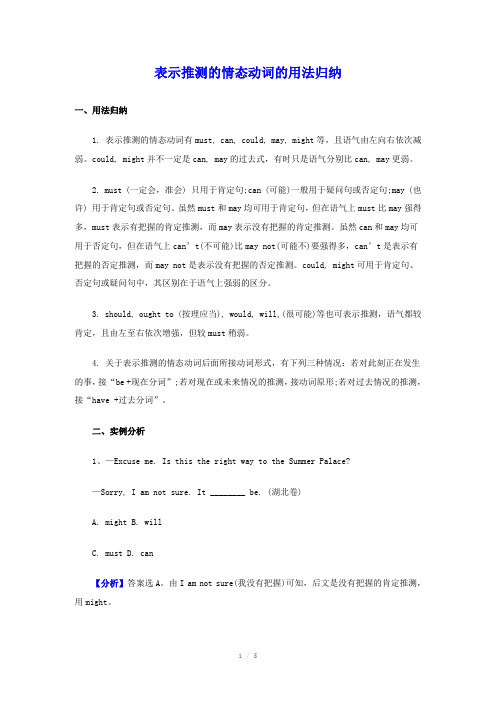
表示推测的情态动词的用法归纳一、用法归纳1. 表示推测的情态动词有must, can, could, may, might等,且语气由左向右依次减弱。
could, might并不一定是can, may的过去式,有时只是语气分别比can, may更弱。
2. must (一定会,准会) 只用于肯定句;can (可能)一般用于疑问句或否定句;may (也许) 用于肯定句或否定句。
虽然must和may均可用于肯定句,但在语气上must比may强得多,must表示有把握的肯定推测,而may表示没有把握的肯定推测。
虽然can和may均可用于否定句,但在语气上can’t(不可能)比may not(可能不)要强得多,can’t是表示有把握的否定推测,而may not是表示没有把握的否定推测。
could, might可用于肯定句、否定句或疑问句中,其区别在于语气上强弱的区分。
3. should, ought to (按理应当), would, will,(很可能)等也可表示推测,语气都较肯定,且由左至右依次增强,但较must稍弱。
4. 关于表示推测的情态动词后面所接动词形式,有下列三种情况:若对此刻正在发生的事,接“be +现在分词”;若对现在或未来情况的推测,接动词原形;若对过去情况的推测,接“have +过去分词”。
二、实例分析1、—Excuse me. Is this the right way to the Summer Palace?—Sorry, I am not sure. It ________ be. (湖北卷)A. mightB. willC. mustD. can【分析】答案选A。
由I am not sure(我没有把握)可知,后文是没有把握的肯定推测,用might。
2、You might just as well tell the manufacturer that male customers ________ not like the design of the furniture. (上海卷)A. mustB. shallC. mayD. need【分析】答案选C。
情态动词表推测的用法

情态动词表推测的用法表示推测的情态动词有must, could, may, might, can, should等。
“情态动词+不定式一般式” 表示对现在或将来的推测,“情态动词+不定式进行式”表示对正在进行的动作或事情的推测,“情态动词+不定式完成式”表示对过去的推测。
一、must表示推测的用法must表示推测时,只用于肯定句,表示很大的可能性,意为“一定,准是,必然会”。
其否定形式是can’t/couldn’t (不可能)。
例如:1. You haven’t eaten anything since this morning; you must be hungry.2. That can’t be Mary —she’s in hospital.二、can/could表示推测的用法1. can表示推测时,多用于肯定句和疑问句。
当用于肯定句时,指“有时可能会”,是理论上的可能,其时间意义宽泛不具体。
例如:Even experienced teachers can make mistakes.2. could表示推测时,既可以用于肯定句,又可以用于疑问句。
例如:My book has disappeared. Who could have taken it?3. can’t/couldn’t表示推测时,用于否定句,是语气最强的否定推测,意为“不可能,一定不(是)”。
例如:He can’t/couldn’t have seen her there.4. can/could在疑问句中表示推测时,含有怀疑或疑问的意味,could比can更不确定。
例如:① Can the news be true?② Who can it be?三、may / might表示推测的用法1. may / might表示推测时,用于肯定句,表示无把握的推测,意为“可能,或许”。
(might 比may 更加不肯定,更无把握)。
情态动词表推测用法总结
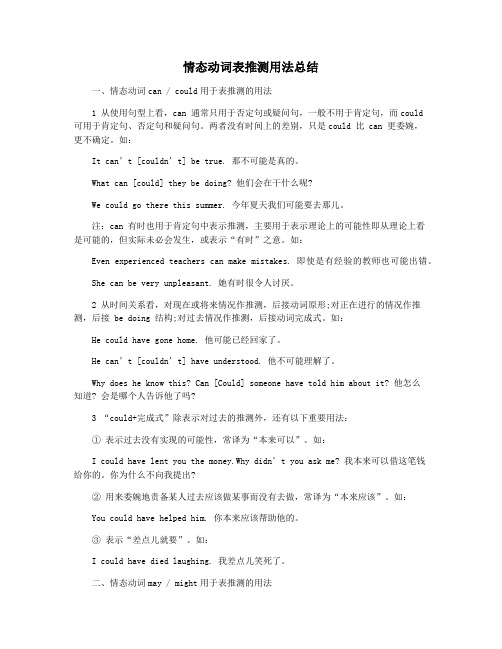
情态动词表推测用法总结一、情态动词can / could用于表推测的用法1 从使用句型上看,can 通常只用于否定句或疑问句,一般不用于肯定句,而could 可用于肯定句、否定句和疑问句。
两者没有时间上的差别,只是could 比 can 更委婉,更不确定。
如:It can’t [couldn’t] be true. 那不可能是真的。
What can [could] they be doing? 他们会在干什么呢?We could go there this summer. 今年夏天我们可能要去那儿。
注:can 有时也用于肯定句中表示推测,主要用于表示理论上的可能性即从理论上看是可能的,但实际未必会发生,或表示“有时”之意。
如:Even experienced teachers can make mistakes. 即使是有经验的教师也可能出错。
She can be very unpleasant. 她有时很令人讨厌。
2 从时间关系看,对现在或将来情况作推测,后接动词原形;对正在进行的情况作推测,后接 be doing 结构;对过去情况作推测,后接动词完成式。
如:He could have gone home. 他可能已经回家了。
He can’t [couldn’t] have understood. 他不可能理解了。
Why does he know this? Can [Could] someone have told him about it? 他怎么知道? 会是哪个人告诉他了吗?3 “could+完成式”除表示对过去的推测外,还有以下重要用法:① 表示过去没有实现的可能性,常译为“本来可以”。
如:I could have lent you the money.Why didn’t you ask me? 我本来可以借这笔钱给你的。
你为什么不向我提出?② 用来委婉地责备某人过去应该做某事而没有去做,常译为“本来应该”。
情态动词表示推测的用法
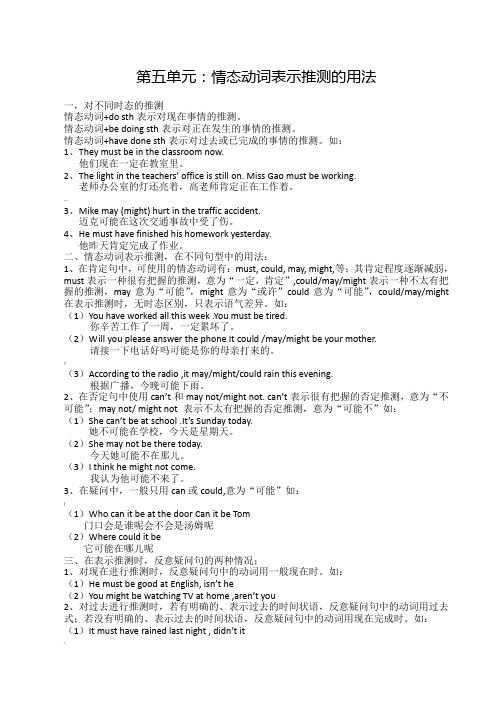
第五单元:情态动词表示推测的用法一,对不同时态的推测情态动词+do sth表示对现在事情的推测。
情态动词+be doing sth表示对正在发生的事情的推测。
情态动词+have done sth表示对过去或已完成的事情的推测。
如:1、They must be in the classroom now.他们现在一定在教室里。
2、The light in the teachers’ office is still on. Miss Gao must be working.老师办公室的灯还亮着,高老师肯定正在工作着。
…3、Mike may (might) hurt in the traffic accident.迈克可能在这次交通事故中受了伤。
4、He must have finished his homework yesterday.他昨天肯定完成了作业。
二、情态动词表示推测,在不同句型中的用法:1、在肯定句中,可使用的情态动词有:must, could, may, might,等;其肯定程度逐渐减弱,must表示一种很有把握的推测,意为“一定,肯定”,could/may/might表示一种不太有把握的推测,may意为“可能”,might意为“或许”could意为“可能”,could/may/might 在表示推测时,无时态区别,只表示语气差异。
如:(1)You have worked all this week .You must be tired.你辛苦工作了一周,一定累坏了。
(2)Will you please answer the phone It could /may/might be your mother.请接一下电话好吗可能是你的母亲打来的。
?(3)According to the radio ,it may/might/could rain this evening.根据广播,今晚可能下雨。
情态动词表示推测用法小结
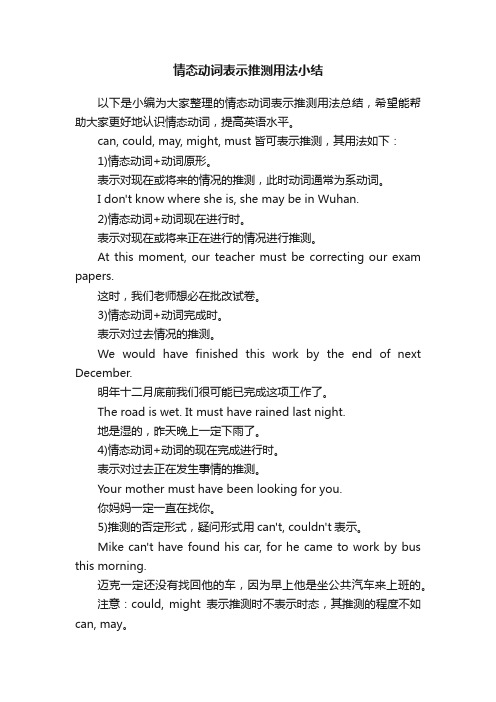
情态动词表示推测用法小结以下是小编为大家整理的情态动词表示推测用法总结,希望能帮助大家更好地认识情态动词,提高英语水平。
can, could, may, might, must 皆可表示推测,其用法如下:1)情态动词+动词原形。
表示对现在或将来的情况的推测,此时动词通常为系动词。
I don't know where she is, she may be in Wuhan.2)情态动词+动词现在进行时。
表示对现在或将来正在进行的情况进行推测。
At this moment, our teacher must be correcting our exam papers.这时,我们老师想必在批改试卷。
3)情态动词+动词完成时。
表示对过去情况的推测。
We would have finished this work by the end of next December.明年十二月底前我们很可能已完成这项工作了。
The road is wet. It must have rained last night.地是湿的,昨天晚上一定下雨了。
4)情态动词+动词的现在完成进行时。
表示对过去正在发生事情的推测。
Your mother must have been looking for you.你妈妈一定一直在找你。
5)推测的否定形式,疑问形式用can't, couldn't表示。
Mike can't have found his car, for he came to work by bus this morning.迈克一定还没有找回他的车,因为早上他是坐公共汽车来上班的。
注意:could, might表示推测时不表示时态,其推测的程度不如can, may。
--------------------------------------------------------------------------------------相关文章推荐:史上最全的not only...but also的用法英语语法大全情态动词表示推测用法小结Shall 用法归纳小结英语中什么是情态动词。
情态动词表推测用法大全
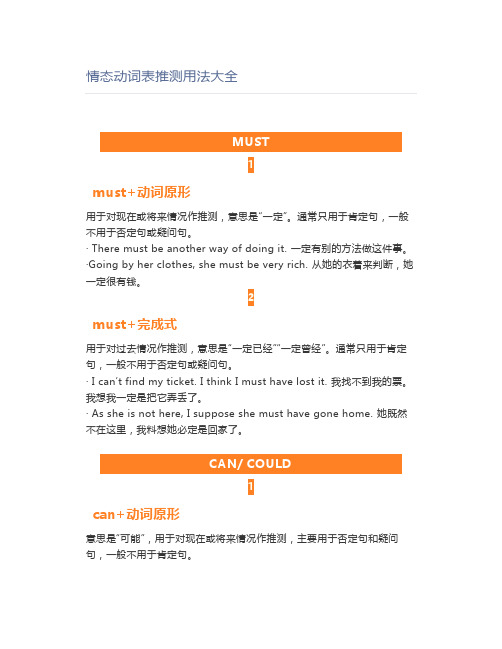
情态动词表推测用法大全1must+动词原形用于对现在或将来情况作推测,意思是“一定”。
通常只用于肯定句,一般不用于否定句或疑问句。
· There must be another way of doing it. 一定有别的方法做这件事。
·Going by her clothes, she must be very rich. 从她的衣着来判断,她一定很有钱。
2must+完成式用于对过去情况作推测,意思是“一定已经”“一定曾经”。
通常只用于肯定句,一般不用于否定句或疑问句。
· I can’t find my ticket. I think I must have lost it. 我找不到我的票。
我想我一定是把它弄丢了。
· As she is not here, I suppose she must have gone home. 她既然不在这里,我料想她必定是回家了。
1can+动词原形意思是“可能”,用于对现在或将来情况作推测,主要用于否定句和疑问句,一般不用于肯定句。
· That can’t be Mary —she’s in hosp ital. 那个人不可能是玛丽——她住院了。
· The moon cannot always be at the full. 月不可能常圆。
· You’ll see the building on your left. You can’t miss it. 那栋建筑在你的左手边。
你一定不会看不到的。
【注意】有时 can 表推测也用于肯定句,但主要表示理论上的可能性,即从理论上看是可能的,但实际未必会发生。
· Food poisoning can cause death. 食物中毒可导致死亡。
· Y ou can go to prison for dangerous driving. 鲁莽驾驶可导致入狱。
情态动词表示“推测”的用法

情态动词表示“推测”的用法英语中,情态动词can / could, may / might, must / can, would / should 等都可以表示“推测”。
具体用法如下:1. can 和couldcan 表示推测时,可能性比较大,用于疑问句或否定句中,不用于肯定句中,意思是“不可能”。
表示一种有把握的推测。
表示否定时,can’t语气最强。
如:It can’t be Mr Li. He has gone to Nanjing already.They can’t know the answer. Let me explain it to them.That can’t be her husband. She is still single.could 表示推测时,可以用于否定句,也可以用在后面跟不定式一般式的肯定句。
表示可能性不大的推测。
意思相当于may / might。
如:Anything could happen if you do not obey the rule.It could be true. But I still doubt it.2. may和mightmay / might 表示一种“可能性很小”的推测。
多用在肯定句或否定句中,might 用在疑问句中表示“可能”,语气最弱。
如:My English teacher may be correcting our exercises in her office.My sister may not be in her room at this moment.The scientists might be discussing the pollution problem.3. must 和can在表示推测的情态动词中,must 的把握最大,意思为“一定,肯定”。
表示对一般情况的推测。
如:Your sister must be a doctor, isn’t she?The boys must be playing football on the playground, aren’t they?Li Ping must be punished by his father.(以上几句要注意其反意疑问句的构成)can的推测用法:在肯定句中can 可以表示客观的(理论的)可能性,并不涉及具体某事是否会发生,此用法常常可以说明人或事物的特征。
(完整版)情态动词表推测归纳

情态动词表推测归纳一、can/couldcan和could没有时态上的区别,只是表示可能性的大小,can表示的可能性比could大。
(1)对现在或将来动作或状态的推测The shy girl can’t (couldn’t) be our monitor.这位害羞的女孩不可能当我们的班长。
(2)对过去事实的推测can (could)+have+动词过去分词,表示推测过去某动作“可能”发生了,或者表示过去某动作有可能发生,但未发生,意为“本来可以……”。
can’t (could’t)+have+动词过去分词,表示推测过去动作一定没有发生。
He’s an hour late, and the bad weather can have delayed him.他迟到了一小时,可能是恶劣的天气使他耽误了。
The road isn’t wet. It couldn’t have rained last night.路面没有湿,昨天晚上肯定没下雨。
二、may/might(1)对现在或将来动作或状态的推测She may (might) be washing her clothes.她可能正在洗衣服。
(2)对过去事实的推测A.may/might+have+动词的过去分词,表示推测过去某动作“也许”发生了;might+have+动词的过去分词,表示推测的语气更加委婉。
He says that she may/might have misunderstood him.他说她可能误解他了。
B.may/might+have+been+动词的现在分词,表示推测过去某动作是否正在进行或一直在进行。
He may/might have been buying stamps when you saw him.你看见他时他可能正在买邮票。
三、must(1)对现在动作或状态的肯定推测“must+动词原形”和“must+be+动词现在分词”表示对现在动作或状态的肯定推测;“can’t+不带to的不定式”,表示对现在动作的否定推测,意为“一定没有……”。
解析情态动词表推测

解析情态动词表推测情态动词表推测的三种时态如下:1、对将来情况的推测,用“情态动词+动词原形”。
(1)She must / may / might / could arrive before 5.5:00前她一定/可能/也许到。
2、对现在或一般情况的推测,用“情态动词+be”,“情态动词+be doing”或“情态动词+动词原形”。
(1)He must/may/might/could be listening to the radio now.他一定/可能/也许正在听收音机。
(2)He can't(couldn't)/may(might) not be at home at this time.这个时候他不可能/可能不在家。
3、对过去情况的推测,用“情态动词+ have +过去分词”。
It must/may/might/could have rained last night.The ground is wet.地湿了,昨晚肯定/可能/也许下雨了。
情态动词表推测可能性大小的排列情态动词有must,can/could may/might,can't/couldn't。
表示推测的情态动词有must,can,could,may,might 等,且语气由左向右依次减弱。
could,might并不一定是can,may的过去式,有时只是语气分别比can,may更弱。
常见的表示推测的情态动词:must, could, may, might, may not, can’t1) 表示肯定推测时,可能性:must一定>could 可能>may也许>migh也许,表示对现在发生的事的推测例如:It is 9:00 p.m. She must be at home. 晚上九点了。
她现在一定在家。
注意:must只用于肯定句如果表示“一定不”,用can’t:She can’t be at home. 她一定不在家。
情态动词推测用法小结
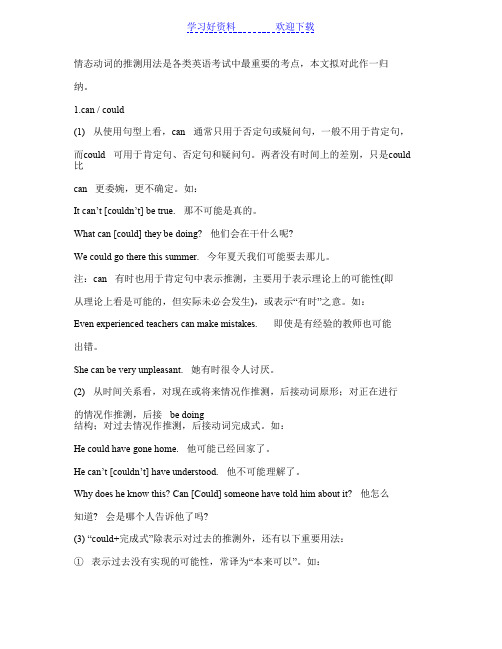
情态动词的推测用法是各类英语考试中最重要的考点,本文拟对此作一归纳。
1.can / could(1) 从使用句型上看,can 通常只用于否定句或疑问句,一般不用于肯定句,而could 可用于肯定句、否定句和疑问句。
两者没有时间上的差别,只是could 比can 更委婉,更不确定。
如:It can’t [couldn’t] be true. 那不可能是真的。
What can [could] they be doing? 他们会在干什么呢?We could go there this summer. 今年夏天我们可能要去那儿。
注:can 有时也用于肯定句中表示推测,主要用于表示理论上的可能性(即从理论上看是可能的,但实际未必会发生),或表示“有时”之意。
如:Even experienced teachers can make mistakes. 即使是有经验的教师也可能出错。
She can be very unpleasant. 她有时很令人讨厌。
(2) 从时间关系看,对现在或将来情况作推测,后接动词原形;对正在进行的情况作推测,后接be doing结构;对过去情况作推测,后接动词完成式。
如:He could have gone home. 他可能已经回家了。
He can’t [couldn’t] have understood. 他不可能理解了。
Why does he know this? Can [Could] someone have told him about it? 他怎么知道? 会是哪个人告诉他了吗?(3) “could+完成式”除表示对过去的推测外,还有以下重要用法:①表示过去没有实现的可能性,常译为“本来可以”。
如:I could have lent you the money.Why didn’t you ask me? 我本来可以借这笔钱给你的。
你为什么不向我提出?②用来委婉地责备某人过去应该做某事而没有去做,常译为“本来应该”。
英语中情态动词表推测的用法
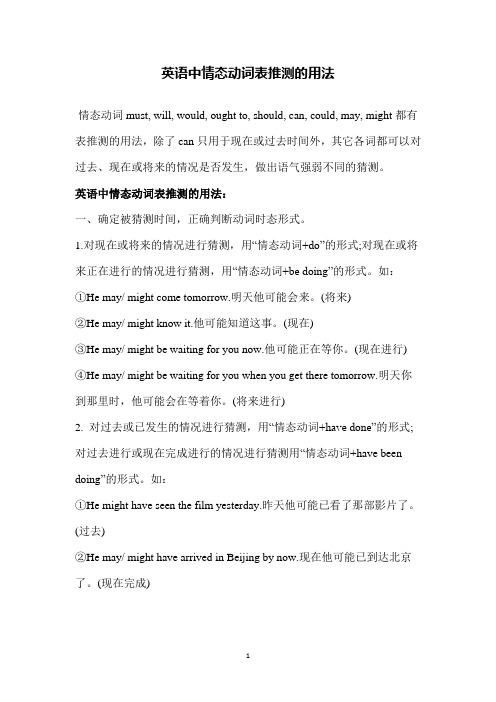
英语中情态动词表推测的用法情态动词must, will, would, ought to, should, can, could, may, might都有表推测的用法,除了can只用于现在或过去时间外,其它各词都可以对过去、现在或将来的情况是否发生,做出语气强弱不同的猜测。
英语中情态动词表推测的用法:一、确定被猜测时间,正确判断动词时态形式。
1.对现在或将来的情况进行猜测,用“情态动词+do”的形式;对现在或将来正在进行的情况进行猜测,用“情态动词+be doing”的形式。
如:①He may/ might come tomorrow.明天他可能会来。
(将来)②He may/ might know it.他可能知道这事。
(现在)③He may/ might be waiting for you now.他可能正在等你。
(现在进行)④He may/ might be waiting for you when you get there tomorrow.明天你到那里时,他可能会在等着你。
(将来进行)2. 对过去或已发生的情况进行猜测,用“情态动词+have done”的形式;对过去进行或现在完成进行的情况进行猜测用“情态动词+have been doing”的形式。
如:①He might have seen the film yesterday.昨天他可能已看了那部影片了。
(过去)②He may/ might have arrived in Beijing by now.现在他可能已到达北京了。
(现在完成)③He might have been waiting for you when you phoned him.你给他打电话时,他可能已在等你了。
(过去完成进行)二、把握猜测语气特点,选择恰当情态动词。
1. 熟记情态动词的语气特点和用法限制。
1)表示肯定的猜测时,各情态动词语气强弱如下:最强——must(一定)will (很有可能)would(很有可能)ought to(应该,很有可能)should(应该,很有可能)can(可能)could(可能)may(可能)最弱——might(可能)2)表示否定的猜测时can't / couldn't语气最强,指“不可能”;may / might not语气最弱,意思是“可能不”。
情态动词表推测完全总结

使用不当的情态动词表推测
总结词
使用不当的情态动词表推测是常见的错误,如使用 "will"来表示未来的可能性。
详细描述
情态动词中,"will"通常表示未来的事实或确定性,而 不是可能性。在表示推测时,应使用其他情态动词, 如"may"、"might"、"could"、"can"、"should"、 "ought to"、"likely"、"probable"、"possible"等。
01
用于否定推测的常用情态动词有 “can't”、“couldn't”、 “shouldn't”。
02
表示对过去、现在或将来的情况 作否定推测,通常与完成时态或
将来时态连用。
用于否定推测时,语气从强到弱 依次为“can't > couldn't > shouldn't”。
03
例句:She can't have left already.(她不可能已经离开了。)
语境理解错误导致的误用
要点一
总结词
语境理解错误导致的情态动词误用是常见的错误,如根据 不充分的信息做出过于肯定的推测。
要点二
详细描述
在使用情态动词表推测时,应充分考虑语境和信息来源的 可靠性。如果信息不充分或不可靠,应谨慎使用情态动词 ,避免做出过于肯定的推测。同时,应注意区分客观事实 和主观猜测,避免将主观猜测表达为客观事实。
will/would 表推测
总结词
表示基于现有信息对未来的推测。
情态动词表推测用法总结(整理稿)
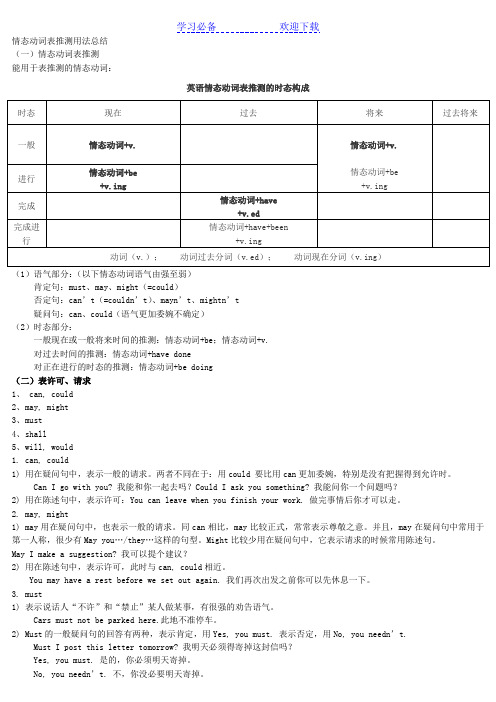
情态动词表推测用法总结(一)情态动词表推测能用于表推测的情态动词:英语情态动词表推测的时态构成(1)语气部分:(以下情态动词语气由强至弱)肯定句:must、may、might(=could)否定句:can’t(=couldn’t)、mayn’t、mightn’t疑问句:can、could(语气更加委婉不确定)(2)时态部分:一般现在或一般将来时间的推测:情态动词+be;情态动词+v.对过去时间的推测:情态动词+have done对正在进行的时态的推测:情态动词+be doing(二)表许可、请求1、 can, could2、may, might3、must4、shall5、will, would1. can, could1) 用在疑问句中,表示一般的请求。
两者不同在于:用could 要比用can更加委婉,特别是没有把握得到允许时。
Can I go with you? 我能和你一起去吗?Could I ask you something? 我能问你一个问题吗?2) 用在陈述句中,表示许可:You can leave when you finish your work. 做完事情后你才可以走。
2. may, might1) may用在疑问句中,也表示一般的请求。
同can相比,may比较正式,常常表示尊敬之意。
并且,may在疑问句中常用于第一人称,很少有May you…/they…这样的句型。
Might比较少用在疑问句中,它表示请求的时候常用陈述句。
May I make a suggestion? 我可以提个建议?2) 用在陈述句中,表示许可,此时与can, could相近。
You may have a rest before we set out again. 我们再次出发之前你可以先休息一下。
3. must1) 表示说话人“不许”和“禁止”某人做某事,有很强的劝告语气。
Cars must not be parked here.此地不准停车。
情态动词表示推测的用法
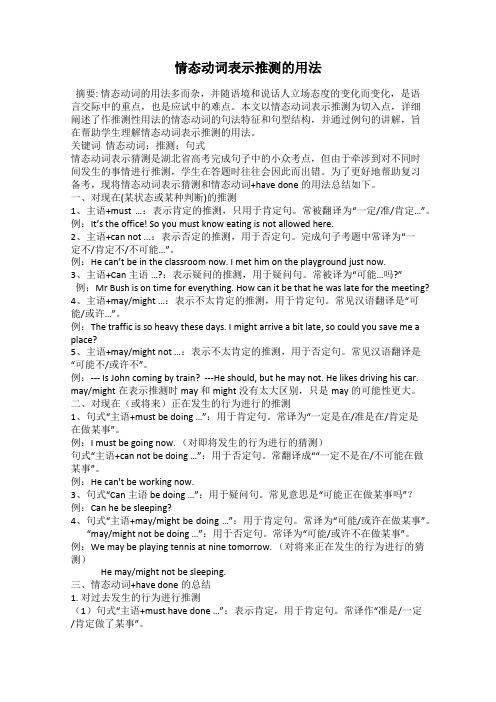
情态动词表示推测的用法摘要: 情态动词的用法多而杂,并随语境和说话人立场态度的变化而变化,是语言交际中的重点,也是应试中的难点。
本文以情态动词表示推测为切入点,详细阐述了作推测性用法的情态动词的句法特征和句型结构,并通过例句的讲解,旨在帮助学生理解情态动词表示推测的用法。
关键词情态动词;推测;句式情态动词表示猜测是湖北省高考完成句子中的小众考点,但由于牵涉到对不同时间发生的事情进行推测,学生在答题时往往会因此而出错。
为了更好地帮助复习备考,现将情态动词表示猜测和情态动词+have done的用法总结如下。
一、对现在(某状态或某种判断)的推测1、主语+must …:表示肯定的推测,只用于肯定句。
常被翻译为“一定/准/肯定…”。
例:It’s the office! So you must know eating is not allowed here.2、主语+can not ...:表示否定的推测,用于否定句。
完成句子考题中常译为“一定不/肯定不/不可能…”。
例:He can’t be in the classroom now. I met him on the playgr ound just now.3、主语+Can 主语…?:表示疑问的推测,用于疑问句。
常被译为“可能…吗?”例:Mr Bush is on time for everything. How can it be that he was late for the meeting?4、主语+may/might …:表示不太肯定的推测,用于肯定句。
常见汉语翻译是“可能/或许…”。
例:The traffic is so heavy these days. I might arrive a bit late, so could you save me a place?5、主语+may/might not …:表示不太肯定的推测,用于否定句。
- 1、下载文档前请自行甄别文档内容的完整性,平台不提供额外的编辑、内容补充、找答案等附加服务。
- 2、"仅部分预览"的文档,不可在线预览部分如存在完整性等问题,可反馈申请退款(可完整预览的文档不适用该条件!)。
- 3、如文档侵犯您的权益,请联系客服反馈,我们会尽快为您处理(人工客服工作时间:9:00-18:30)。
补充强调:推测的句型特点(对某一次的推测句型有两部分:语气和时态)(1)语气部分:(以下情态动词语气由强至弱)肯定句:must、may might ( =could)否定句:can,t ( =couldn 't )、mayn t> mightn 't疑问句:can> could (语气更加委婉不确定(2)时态部分:have done 表示对过去的推测be doing 表示对正在进行的推测be表示对现在的推测语气部分写在前时态部分写在后,组合在一起就是推测(-)情态动词表推测的三种句_能用于表推测的情态动词:must, can, could, will, would, may, might, should, ought to1. 在肯定句中一般用must (一定),may (可能),might / could (也许,或许)。
(1)He must/may/might know the answer to this question? 他一定/可能/也许知道这个问题的答案。
(2)It is cold in the room・ They must have turned off the heating・屋里很冷,他们肯定把暖气关了。
2. 否定句中用can't / couldn 't (不可能),may not/might not (可能不)。
(1)It can J t/couldn 't be the headmaster・ He has gone to America.这不可能是校长,他去美国了。
(2)He may not/might not know the scientist.他也许不认识那位科学家。
3. 疑问句中用can /could (能..?)。
(1) Could he have finished the task?他可能把任务完成了吗?(2) Can he be at home now?他现在能在家吗?注:以上三种句式中情态动词的语气按程度都是依次递减的。
Might, could并非的过may, can 去式,而表示语气较为委婉或可能性较小。
(二)情态动词表推测的三种时丄1.对将来情况的推测,用丨“情态动词+动词原形”。
(1) She must / may / might / could arrive before 5. 5:00前她一定/可能/也许到。
(2) She must/may/might/could walk miles and miles among the hills without meeting anyone・她一定/ 可能/也许会在山里一连走好几英里而遇不到一个人。
(1)He must / may / might / could be listening to the radio now.他一定/可能/也许正在听收音机。
(2)He can't ( couldn 't ) / may ( might ) not be at home at this time.这个时候他不可能/可能不在家。
(3)Mr. Bush is on time for everything . How can ( could ) he be late for the opening ceremony 布什先生一向准时,这次开幕式他怎么可能迟到呢?3•对过去情况的推测,用丨“情态动词+ have +过去分词”丨。
(1)It must / may / might / could have rained last night .The ground is wet.地湿了,昨晚肯定/可能/也许下雨了。
(2)The door was locked. He can ( could ) not / may ( might ) not have been at home .门锁着,他不可能/可能不在家。
(3)Can / Could he have gotten the book ?难道他找到书了吗?注:情态动词should / ought to 表推测时,意为"想必会,理应”但与"have +过去分词”连用时,则又可构成虚拟语气意为“本应该做某事却没做”。
例如:(4)It 's seven o 'clock. Jack should/ought to be here at any moment.现在七点钟了,杰克理应随时到达。
(推测)(5)She should / ought to have attended your birthday party, but she had to look after hermot her in hosp it al. (虚拟)她本该出席你的生日晚会的,可是她得在医院照顾她妈妈。
(6)Tom should not /ought not to have told me your secret, but he meant no harm. (虚拟)汤姆本不该告诉我你的秘密,可是他并无恶意。
(三)几组表推测的情态动词用法情态动词+完成时”是历年高考的热点,在做此类练习时,既需要掌握这一结构的基本用法,又应该仔细体会题干所提供的语言信息,准确理解语言环境和说话人的含义,尤其要注意题干中时态给予的暗示。
1. must have done表示对已经发生的事情的推测,意为一定,想必”,句子中表示的是一-种肯定的推测。
这种结构一般只用于肯定句,其否定形式是can,t (couldn ')thave done,表示不可能,肯定不会”。
例如:He didn ' t hear the phone ・ He must have been asleep・他没有听到电话响,他肯定是已经睡着了。
He must have bee n to Shan ghai・他一定去过上海。
They can 't have gone out , because the light is on .他们不可能出去,因为灯亮着。
2. can (could) have done表示对过去的时间内可能发生的事情的猜测,can have done —般只用于否定句和疑问句。
could have done还可以用于肯定句,常用来表示本来可能完成而实际未完成的动作。
例如:He can 't have finished the work so soon.这项工作他不可能完成得这样快。
We could have walked to the station , it was so near .我们本来是可以走到车站去的,路很近。
3. may ( might ) have done(1)表示对已经发生的事情的不太肯定的推测,意为“可能已经,或许已经”。
(2)虚拟用法表示本可以做,但却没做(表示很委屈地责备)If we had taken the other road , we might have arrived earlier.如果我们选择另一条路,我们可能会到得早一些。
He might have given you more help, he was very busy.他本来是可以给你更多帮助的,尽管他很忙。
4. needn 't have don指实际上做了本来不必要做的事,意为本来不必”例如:There was plenty of time . She needn 't have hurried.时间很充裕,她本不必匆忙。
You needn 't have told him the news.他本来不必把这个消息告诉他。
5. should (ought to ) have done指本该做而实际未做的事,意为“本来应该”。
其否定式(oughtn shouldn *t ')thave done则表示某种行为不该发生但却发生了。
例如:You should have started earlier , but you didn ' t.你本应该早一点出发,但是你没有。
You ought to have helped him (but you didn ) '. t 你本应该帮助他。
We shouldn 't have waited for her because she never came.我们本不应该等她,因为她根本不会来。
6. Would have done本想做(却没做)wouldn 't have done本不想做(却做了)I would have helped you, but I was too busy.我本想帮你,但我太忙了I stayed at a hotel in New York.——Oh, did you ? You ___ with Barbara.A. could have stayedB. could stayC. would say 2 Why didn ' t you tell me there was no meeting today ? I all tahye hwere through the heavy snow.4 A : Is John coming by train ?B: He should, but he ______ not. He likes driving his car.A. mustB. canC. needD. may5. Mr. White _____ a t 8:30 for the meeting, but he didn ' t show up.A. should have arrivedB. should arriveC. should have had arrivedD. should be arriving6. Sorry, I 'm late ・_I_h_a_ve turned off the alarm and gone to sleep again.A. mightB. shouldC. canD. will7. You _____ be tired — You've only been working for an hour ・A. must notB. won ' tC. can ' t D ・ may not8. —— I didn ' t go torkwyoesterday afternoon because my car broke down.1. D. must have stayedA. needn ' t have drivenB. can ' t have drivenC. mustn ' t have drivenD. shouldn ' t have driven3. I was really anxious about you. You home without a word.A. mustn ' t leave C. couldn ' t have leftB. shouldn ' t have leftD. needn ' t leaveYou mine. I wasn t using it.A. might borrowB. could have borrowedC. can have borrowed 9. ——A man answered the phone.D. ought to borrowI suppose it was her husband.A. mustn r t beB. couldn !t have beenC. may not have been ——It her husband.D. mustn 't have beenHe has been dead for ages.1) 1. 选择填空I didn ,t see A. mustn't C. needn't 2. One ought her in have spoken have spoken for what one has J nt done.the meeting room this morning ・ She at the meeting. B. shouldn ,t have spoken D. couldn ,t have spokenA. not to be punishedB. to not be punishedC. to not punished D ・ not be punished 3. If you really want yourself to be in good health, you must ________ always ____A. not; be smokingB. not; have smokedC. not; to smoke D ・ be not: smoking 4. With so much work on hand, you _______ t o see the game last night ・ mustn't go B. shouldn't go C. couldn ,t have goneD. shouldn ,t have gone 5. MostA. of the students felt rather disappointed at the English party ・ They say that it organized ・A. had beenB. had to beC. must have beenD. could have beenbetter 6. I'm surprised that he _ in the exam ・A. should failB. would have failedC. may have failedD. should have failed 7. The little girl there alone.A. not dare goB. dares not goC. dare 8. "Must we do it now?” N “ A. won ' t B. needn't 9. He said he would rather not A. doing B. to do C. do 10. You ____ to the meeting this afternoon if you havesomething important to do.A. needn't to comeB. don't need comeC. don't need comingD. needn't come11.Put on more clothes ・ You _ be feeling cold with only a shirt on. A. can B. could C. would D. mustnot go D. dare not to go o , youC. can ,t it right now.D. don't D. to be doingA. mayB. might C ・ could D. must 14. There was plenty of times ・ She _・A. mustn ,t have hurriedB. couldn ,t have hurriedC. must not hurryD. needn't have hurried 15. The plant is dead ・ I _it more water ・12. I ___ p lay football than basebal1.A. would ratherB. had betterC. like betterD. prefer 13. I thought you _ like something to read, so I have brought you some books.16. Youreturn the book now. You can keep it till next week if you like.C. mustn' t waitD. needn' t wait20. — May I stop here? — No, you _______ .A. mustn'tB. might notC. need n'tD. won 421. Ifs a fine day. Let 1 s go fishi ng, ___ ・A. won ' tweB. will weC. don 4 weD. shall we22. I didn*t see her in the meeting room this morning. She _____ at the meeting.A. mustn't have spoke nB. should n't have spokenC. needn't have spokenD. couldn't have spoken23. — Please don 4 make a noise.— ____ . I ' llbe as quiet as a mouse.A. Yes, I won'tB. No, I won'tC. No, I willD. Yes, I will24. The young man has made so much noise that he _____ not have been allowed to attend the concert.A. couldB. mustC. wouldD. should25. — Where is John? — He ________ in the library.A. should beB. must beC. can beD. must have been26. Since the road is wet this morning, ____ last night.A. it must rainB. it must be rainingC. it must have rainedD. it must have been rain 27. — Will your brother stay home tonight?— I ' m not quite sure. He _____ to the cinema tonight.D. can't have doneA. can'tB. mustn't 17. Ifs still early, you _____ . A. must n't hurry B. would n 't hurry 18. Please open the window, ___ ? A. can't you B. aren 11 you 19 WeC. needn'tD. may not C. may not hurry D. don't have to hurryC. do youD. will you for her because she never came. A. must n't have waited B. should n't have waitedA. must goB. can go 28. She*s already two hours late. What A. can have happenedC. should have happened 29. You must be a writer, ____ ?A. mustn't youB. are you 30. I got up early that morning, but I _ A. mustn't have doneC. needn't have doneC. may goD. may be going ___ toher?B. may have happened D. must happenC. must youD. are n't you so because I had no work to do. B. didn't need to do31. He _____ haveA. could32 I missed theA. must33. He ought toA. oughtn't34. Everyone ___ come here yesterday,B・ shouldlast bus, so I go home on foot.B・ have to win the firstprize, he?B・ shouldn,tdo his best for the but he did' tn.C. ought toC. mayC. mustn,tmodernizationsD. all the aboveD. had toD. both A and Bofour country.A. canB. may35. Let's clean our classroom,C. shouldD. mighttomorrow.A. mustB. may C ・ shall D. both B and C38. “Your phone number again? I _quite catch i” t. “It ' s 9568442.A. didn ' tB. couldn ,tC. don tD. can" t39. Mother _____ u s stories when we were children.A. was used to tellB. is used to tellingC. used to tellD. used to telling40. She would rather _____ more money on books ________ on clothes.A. cost …notB. to spare …don'tC. pay •••tha nD. spe nd •••tha n1. You ____ return the book now. You can keep it till next week if you like.4. I didn ,thear the phone ・ I _ asleep ・A. must beB. must have beenC. should beD. should have been5. If my lawyer _ here last Saturday, he _ me from going.A. had been; would have preventedB. had been; would preventC. were; would preventD. were; would have prevented6. He ____ you more help, even though he was very busy ・A. might have givenB. might have C ・ may have given D ・ may give7. If it _ for the snow, we _______ the mountain yesterday.A. were not; could have climbedB. were not; could climbC. had not been; could have climbedD. had not been; could climb8. Without electricity human life quite difficult today.A. isB. will be C ・ would have been D. would be9. A computer _____ think for itself, it must be told what to do.A. can tB. couldn'tC. may notD. might not10. Jenny ____ have kept her word ・ I wonder why she changed her mind ・A. mustB. shouldC. needD. would11. We _____ last night, but we went to the concert instead.A. must have studied B ・ might study C ・ should have studied D ・ would study12— Could I borrow your dictionary?—Yes, of course you _______ ・A. mightB. willC. canD. should13. Tom ought not to ____ me your secret, but he meant no harm ・A. have told B ・ tell C ・ be telling D ・ having toldA. will youB. don" t weC. shall weD. do you 36. Let us play A. will you basketball, _?B. don ,t weC. shall weD. do you 37. He asked me for this book many times. Please tell him that he have itA. can'tB. mustn't 2. Where is my pen? I ____ it.A. might loseB. would have lost3. I wish I _____ you yesterday. A. seen B. did seeC. needn'tD. may notC. should have lostD. must have lostC. had seenD. were to see14. 一If he ____ , he _____ that food・—Luckily he was sent to the hospital immediately.A. was warned; would not takeB. had been warned; would not have takenC. would be warned; had not takenD. would have been warned; had not taken15. Peter ____ come with us tonight, but he is" ntvery sure yet.A. mustB. mayC. canD. will16. I told Sally how to get here, but perhaps I for her ・A. had to write it outB. must have written it outC. should have written it out D ・ ought to write it out17. I didn't see your sister at the meeting. If she , she would have met my brother ・B. has brokenC. were brokenD. had been broken20. It's nearly seven o' clock ・ Jack be here at any momentA. mustB. needC. shouldD. can21 ・ 一 There were already five people in the car but they managed to take me as well.一 It ____ a comfortable journey ・A. can't be B ・ shouldn ,t be C ・ mustn ,t have been D. couldn ,t have been22. Johnny, you ____ p lay with the knife, you _hurt yourself.A. won 't; can ,tB. mustn't; mayC. shouldn 't; mustD. can't; shouldn ,t23. The fire spread through the hotel very quickly but everyone get out ・A. had toB. would C ・ could D ・ was able to24. 一 When can I come for the photos? I need them tomorrow afternoon. 一 They be ready by12:00.A. canB. shouldC. mightD. need25. 一 I stayed at a hotel while in New York ・一 Oh, did you? You _______ with Barbara ・A. could have stayed B ・ could stay C ・ would stay D ・ must have stayed26. — Will you stay for lunch?一 Sorry, _ ・ My brother is coming to see me.A. I mustn ' tB. I can ,tC. I needn'tD. I won ' t27. — Are you coming to Jeff's party?一 I'm not sure ・ I _go to the concert instead ・A. mustB. would C ・ should D ・ might28. 一 Write to me when you get home ・A. I mustB. I shouldC. I willD. I can29. I was really anxious about you, you home without a word ・A. mustn ' t leave B ・ shouldn't have left C ・ couldn ,t have left D ・ needn't leave30. — Is John coming by train?一 He should, but he ______ not ・ He likes driving his car ・A. mustB. canC. needD. mayA. has come 18. — Shall I 一 No, you A. needn'tB. did come C ・ came tell John about _ ・ I've told B. wouldn ' t D. had come19. When a pencil is partly in it? him already. C. mustn ,t aglass of water, it D. shouldn ,tlooks as if itA. breaks。
